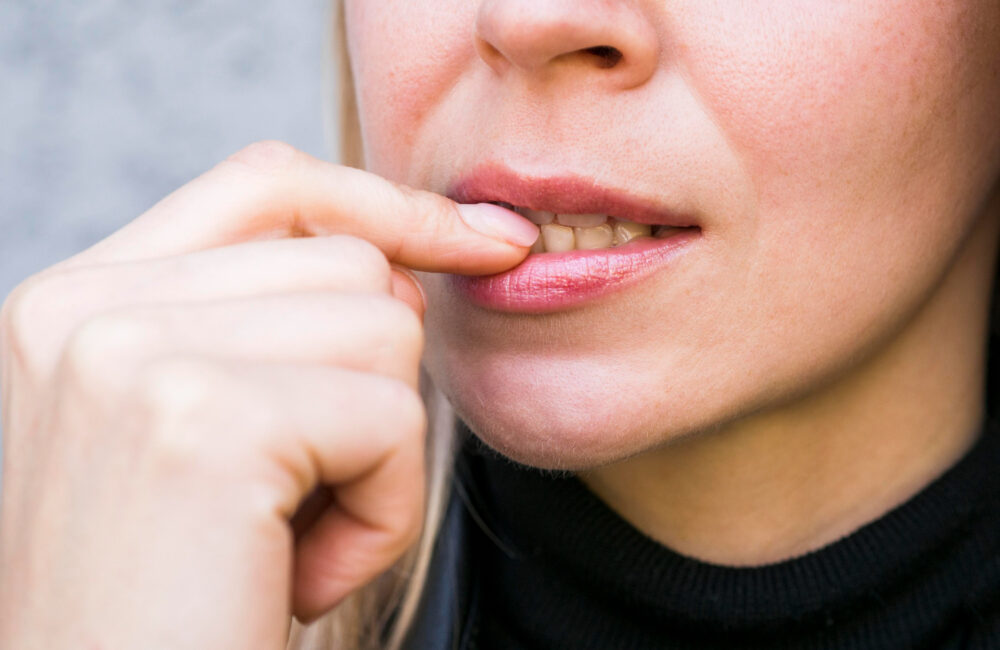
Practicing good oral hygiene — brushing your teeth, flossing, and regularly visiting the dentist — is a great way to keep your teeth and gums healthy. However, some bad dental habits can wreak havoc on your oral health. Here are seven of the worst dental habits and how you can stop them.
Bad Dental Habits That Are Impacting Your Oral Health
Nail Biting
Does biting your nails ruin your teeth? It certainly can. This nervous habit can not only chip and crack your teeth, but it can also negatively impact your jaw. Regular nail biting puts your jaw in a protruding position, which places unnatural pressure on it and can lead to jaw dysfunction and TMJ disorder.
To help break your habit, consider using bitter-tasting nail polish to stop yourself from putting your fingers in your mouth. Stress reduction techniques can also help curb your need to bite your nails.
Brushing Too Hard
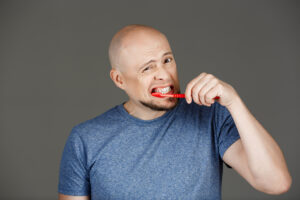
You may think vigorously brushing your teeth is the best way to remove plaque and keep your teeth clean, but you might do more harm than good. Brushing too hard can wear down your enamel and irritate your gums, making your teeth and gums more prone to decay, damage, and sensitivity.
When you’re brushing your teeth, think massage, not scrubbing. Since plaque is soft and loose, you can remove it by gently massaging your teeth.
Using the Wrong Toothbrush
In addition to brushing your teeth too hard, you may use the wrong toothbrush for your oral routine. While firm toothbrushes can help remove tooth stains, they aren’t recommended for everyday use because they may wear down your enamel, irritate your gums, and make your teeth more sensitive.
If you’re using a firm-bristled toothbrush regularly, switch to a soft-bristled toothbrush with the American Dental Association (ADA) Seal of Acceptance.
Teeth Grinding
Teeth grinding or clenching — also known as bruxism — can lead to several dental problems, including chipped teeth, fractured fillings, cracked crowns, damaged dentures, and joint pain. Stress and anxiety may trigger this bad habit, but you might also have an abnormal bite that causes you to grind and clench your teeth.
When it comes to solutions, night guards are an excellent way to protect your teeth, but they won’t stop you from grinding or clenching your teeth. Consider relaxation exercises, deep breathing, counseling, and reducing alcohol and caffeine to help alleviate your bruxism.
Consuming Sugary Foods and Drinks

Indulging in a bag of candy or a bottle of soda is fine in moderation. However, consuming too much on a regular basis can be detrimental to your oral health. Sugar promotes bacterial growth that can cause tooth decay, while beverages like soda and fruit juice often contain acids that dissolve tooth enamel.
The best solution is to avoid these sugary foods and beverages, but if you decide to treat yourself, rinse your mouth with water afterward to clean away any remaining sugars.
Using Your Teeth as Tools
Relying on your teeth to open packages, remove tags, or perform other tasks can also be harmful. This habit can put you at higher risk of cracking your teeth, injuring your jaw, or accidentally swallowing a foreign object. Your teeth are made for chewing food, so take a second to find a pair of scissors, bottle opener, or any other tool you need to complete your task.
Chewing Ice Cubes
Do you usually chew the leftover ice cubes after drinking a refreshing beverage? If so, you should break this habit because chewing ice can harm your teeth. Each time you crunch down on some ice cubes, there’s a chance of cracking or chipping your tooth enamel, which can lead to a dental emergency.
If you can, chill your beverage before you drink it, avoiding ice altogether. If not, drink from a straw so you won’t be as tempted to chew the ice.
Final Thoughts on These Bad Dental Habits
If any of these habits sound familiar, you can change your ways and help improve dental health. Breaking your habit might be difficult initially, but if you take small steps, you can kick it for good. A great start is by visiting your dentist with a dental savings plan.
Do I still need to see a dentist if I have dentures? Here’s the answer.


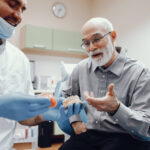

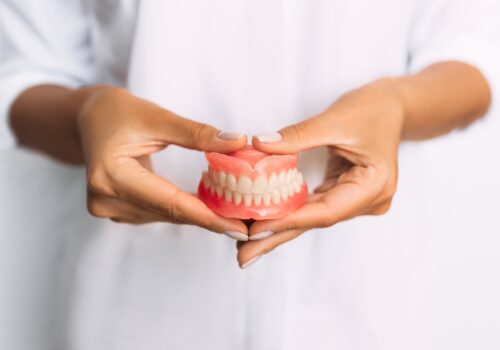
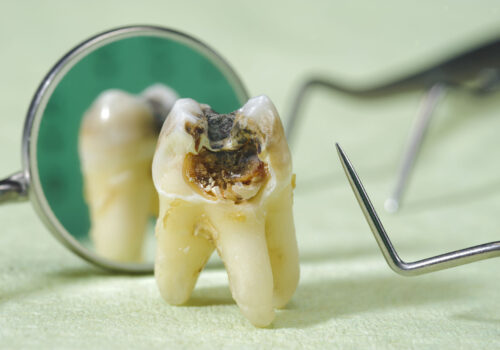
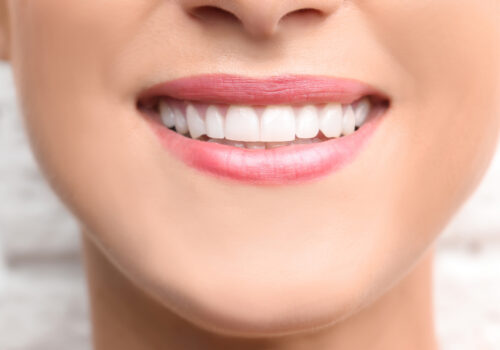
Pingback: What is Preventive Dentistry? -